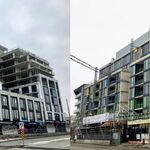mig174
Active Member
Just visited NYC. RE prices are around the same as here. This is not NYC. It will bust.
Just visited NYC. RE prices are around the same as here. This is not NYC. It will bust.
Well, sure, but then again $800+ per psf would apply to individual buildings in downtown Toronto, but not Toronto as a whole (and not even downtown as a whole).$1000 psf would apply to parts of Manhattan, not NYC as a whole (all the boroughs together).
I dunno, maybe it's just me but 10% doesn't seem high to me. I would have guessed it would have been higher for the buildings still under construction.Is 10% really that high a number for a new building? Especially one with a ton of investors?
Canada Mortgage and Housing Corp. says that it has seen mortgage refinance activity drop nearly 40 per cent since Ottawa brought in new rules.
The crown corporation, which must now issue quarterly financial results as a result of a new law, issued its second-quarter results on Monday and they include insight into how Canada’s housing industry is faring.
More related to this story
CMHC said that refinance activity fell by almost 40 per cent and has continued to remain around that level since Finance Minister Jim Flaherty made changes to the mortgage insurance rules earlier this year. One of those rules was to reduce the maximum amount that Canadians can borrow in refinancing their mortgages from 90 per cent to 85 per cent of the value of their homes. That rule kicked in on March 18.
Among the other rule changes, Mr. Flaherty cut the maximum term of new mortgages where the home-buyer’s down-payment was less than 20 per cent from 35 years to 30 years.
CMHC said Monday that after the rules took effect purchases of CMHC homeowner mortgage insurance initially fell by about 10 per cent, and by the end of June was still about five per cent below the level of sales before the rule changes.
But CMHC’s profits still rose by $61-million or 19 per cent, to $383-million, for the three months ended June 30 thanks to earnings from mortgage-backed securities, gains from selling financial instruments, and lower expenses.
Latest Teranet numbers:
Canada
May 2010: 136.32
May 2011: 142.27 (+4.36%)
Vancouver
May 2010: 155.23
May 2011: 164.92 (+6.24%)
Toronto
May 2010: 123.03
May 2011: 128.72 (+4.62%)
These indices are the highest in history. May 2011 represents a new peak for Canada, Vancouver, and Toronto. Calgary is still quite a bit off the peak though. Calgary's peak was 175.31 in Aug. 2007, but it's only 153.72 in May 2011, which represents a 12.3% drop from peak. In contrast, Toronto is up 15.7% from Aug. 2007's 111.27 (which is when I bought my current house). So if there was a 15% drop by next year, I'd just be back where I started.
June Teranet numbers are out.
June 2011 is 131.26, a 2% gain since last month (128.72), and a 3% gain since last year (127.43).
(Check the 6:30 - 7:00 part. According to this, some of the buildings in downtown are 80-90% investor owned)
http://www.moneyville.ca/article/1049562--which-gta-homes-chinese-investors-are-buying?bn=1Richard Ling knows all too well that some Asian luxury market buyers have particular tastes.
“It has to be over the top,†says the exuberant Ling, an upscale home specialist with Harvey Kalles Real Estate.
Recently, he suggested that one of his clients see a mansion in the Bayview Avenue and York Mills Road area of Toronto that was listed at $18 million.
“It had that understated WASPy elegance. But I think they wanted something a little more showy,†says Ling. “Like the White House.â€
Showy would be the home on Doulton Drive the realtor sold for a Mississauga record price of $7.25 million to a mainland Chinese buyer.
The 14,000-square-foot contemporary home screamed opulence.
“It was like walking into a Bollywood set. There was marble everywhere. It was so shiny you needed sunglasses,†says Ling.
The yellow Ferrari parked in the foyer helped seal the deal. The buyer, who is in the steel business, also had an impressive Ferrari collection.
Hello Toronto. The Chinese are coming — and citizens from the world’s second largest economy are looking for some prime real estate.
Chinese investors have been the largest buyers of pricey Central London real estate so far this year. In Sydney, they are credited with buying up to 60 per cent of all properties in new projects. And in Vancouver, they have been blamed for jacking average prices up by 25 per cent year over year.
Bank of Canada governor Mark Carney has already said Asian wealth is causing prices to move to “extreme†levels in the Vancouver market, where the price of a standard bungalow is more than a million dollars.
But while Vancouver has been getting the lion’s share of attention, Toronto has not escaped notice.
“As Beijing reins in wildly overheated domestic residential markets, the middle class moves its growing wealth offshore into havens such as Canada, Australia and more specifically into Metro Vancouver and Toronto,†said a recent report by Vancouver-based consultancy Landcor. “In China, real estate has long been regarded as a secure bet.â€
In 2007, China had about 22,000 millionaire households and that number is expected to increase to 409,000 by 2017, according to Barclays Wealth.
Toronto prices are cheap in comparison to cities such as Hong Kong, where a mainland Chinese buyer purchased a 6,000-square-foot penthouse last year for $57 million, or $9,000 per square foot, a world-record price.
Asian buyers have already been credited with buying the penthouse at the Ritz Carlton for north of $10 million and an Asian buyer had purchased the penthouse at 1 Bloor for a reported $25 million before the developer scrapped the project during the downturn.
While records are generally not kept on the country of origin for investors, real estate insiders say Asian foreign investment remains high in the Toronto market.
The city is on the map for Chinese investors, particularly after China Investment Corp., one of the world’s top five largest sovereign wealth funds, decided to open its first non-Asian office in the city last year, bypassing other financial centres such as New York and London. With $332 billion in assets, the fund is flush with cash and a major player in the investment world.
The recent global economic turmoil on stock markets will also likely not have much of an impact since real estate is seen as a safe haven for foreign investors, say analysts.
“We are a bigger, more diverse market than say Vancouver, but there is definitely a huge Asian buyer influence,†said Johnson Cheng, sales manager at Peter Street condominiums in the city’s entertainment district.
At the spring launch, Cheng targeted the Asian market by taking out advertising in Chinese newspapers such as Sing Tao and Ming Pao. After most of the units had been sold, he advertised in mainstream media.
He estimates that an astounding 55 to 60 per cent of the buyers in that project were Asian investors. Most of the sales went to mainland Chinese buyers, some of whom were bused in on real-estate “tours†to view properties.
“You get to see Niagara Falls, and in between you can go shopping for a condo,†said Cheng.
Asians typically buy real estate because they feel it’s a safe place to park their money, said Cheng. Canada is also accepting of diversity and the GTA has the largest ethnic Chinese population in North America.
It isn’t unusual for some investors to buy two or three condominiums at a time when visiting the city, said Cheng.
“The typical overseas buyer is trying to preserve wealth. Many of them are children of entrepreneurs who were born in the ’80s and they’ve never really tasted the same kind of hardship their parents have,†said Cheng, who is also a vice-president at condominium specialist Milborne Real Estate Inc.
Kitty Zhu, 24, bought two luxury downtown Toronto condominiums in the same building with her father earlier this year. She is living in a third property she bought last year.
“We think Toronto is a good investment and the lifestyle is very good, much calmer compared to China,†said Zhu, who is studying English in Canada.
Originally from Shangahi, Zhu said learning English and a foreign culture will help her father’s manufacturing business when she returns to China.
“The prices in Toronto are getting higher, but they are still okay when you compare it to China or Hong Kong,†said Zhu.
Asian investors are becoming increasingly sophisticated, sometimes land-banking property by buying acres in the Ontario greenbelt and sitting on it for future development, said Cheng.
One big reason for the wave of investment is that Canada received “approved destination status†from the Chinese government in 2009, which has made getting tourist visas easier for Chinese citizens.
Tourism real estate has since become big business, as tourists drop in to project sites to view property before moving on to the outlet malls.
Another incentive is that Beijing has cracked down on property speculation this year by introducing tough measures such as a 5.5 per cent tax on homes sold within five years to curb flipping.
In Beijing, property prices rose by 28 per cent last year, while in Shanghai prices rose an astounding 26 per cent.
This has caused investors to seek a return elsewhere.
Still, it’s hard to pinpoint the exact amount of investment because Chinese buyers tend to remain secretive about their wealth. And without hard Canadian statistics, separating myth from fact about Chinese investors remains an issue, according to a recent Colliers report.
“A number of recent launches reported large numbers of Asian buyers. Yet a significant portion of these buyers are actually local residents, not foreigners,†said the report.
That could also be the case in Toronto, where Chinese-Canadian investors may be active in the buying pool.
“A significant portion of what is perceived to be buying by offshore investors is, in fact, driven by Chinese immigrants who are integrated into the community but still maintain strong links to mainland China, with many residing and working in China while their family establishes roots,†said CIBC economist Benjamin Tal in a report on the housing market.
Mimi Ng, a vice-president at developer Menkes, says the Toronto market is larger than Vancouver and attracts a much more diverse crowd.
“There is certainly a lot of Chinese investment here. But that is also hand in hand with South Asians, Middle Eastern, Russian and Korean investment,†said Ng.
So far there hasn’t been a backlash in Toronto similar to Vancouver. In 1988, the iconic Expo site in the city’s downtown was purchased by investors including Hong Kong billionaire Li Ka Shing.
The group built condos and sold them in Asia first, provoking anger among some Vancouver residents.
Toronto’s last wave of Asian investment occurred in the ’80s, when Hong Kong immigrants, worried about the handover back to Chinese rule, snapped up properties in the GTA causing a mini-boom, and a negative reaction by some local residents who felt they had been priced out of the market. But that wave ended in a few years after many immigrants realized business opportunities in China outweighed living in Canada.
However, realtor Ling expects the new Chinese wave will be longer lasting.
“This isn’t just one tiny British colony. They are pumping out billionaires on a huge scale and it will continue to have a huge impact on the Toronto market,†said Ling. “ think this will turn out to be massive.â€




